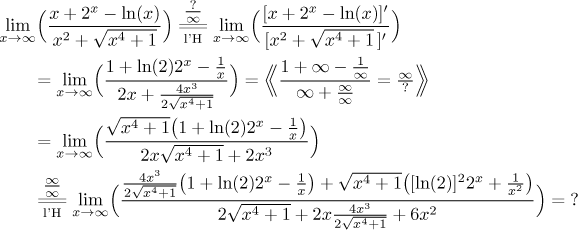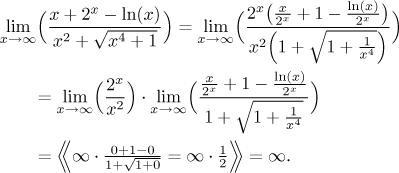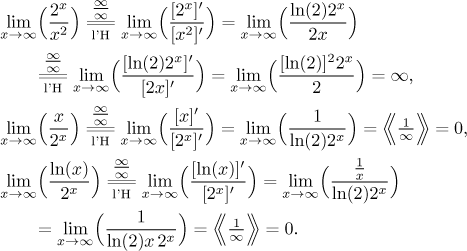Problem: Evaluate (if it exists) the limit
![]()
Solution: This is a standard problem, we want to find a limit of an expression that exists on a reduced neighborhood of the limit point. Thus we start by substituting this point into the expression.
![]()
Is this an indeterminate ratio? We can't be sure, since we do not know what is happening in the numerator. Still, the standard method for solving indeterminate ratios is l'Hospital's rule and it also has a more general version that applies to "something over infinity", which fortunately fits. Let's try it.

This might be the right moment to give up. Obviously, the expression is not getting any better, in the second l'Hospital we had to differentiate products, which made the whole thing about twice as big, the roots will never disappear by differentiation. An experienced limit-solver would actually give it up after the first l'Hospital or even earlier, as there is a better way.
Since the expression contains only powers, exponentials, and logarithms (with a square root thrown in for a good measure) and we are looking for a limit at infinity, this is a prime candidate for the box "polynomials and ratios with powers at infinity". We need to determine the dominant terms.
In the numerator we have a power, an exponential and a logarithm, so the
dominant term is clear: the exponential 2x. In the
denominator we have to start with the root. In the expression under it, the
dominant term is x4, so the whole square root is of the
type x2, which si the same as the first term. Thus the
dominant term in the denominator is x2. There are two terms
of this type, but they are added, so no trouble is expected. The given
expression therefore behaves (around infinity) like
![]()
Of course, this has to be proven.

We need to work out the fractions that we skipped in the calculations, they are better done separately:
